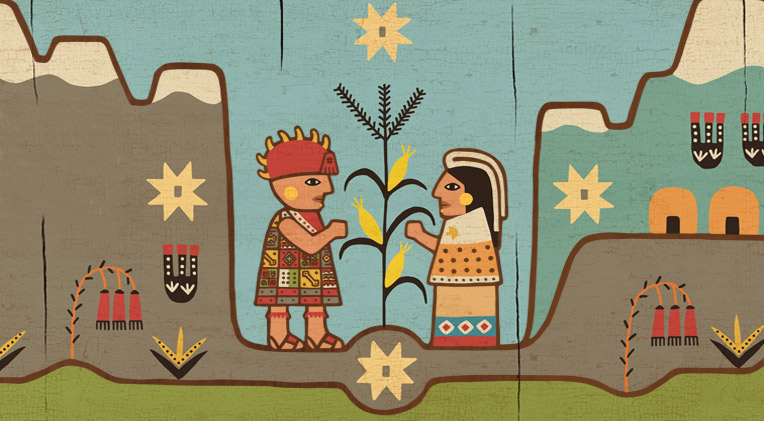Although Peru was the cradle of several ancient civilizations, the greatest empire that has ever existed in Peruvian territory was the powerful Inca Empire. This empire was vaster than other American ancient empires, such as the Aztecs or Maya. The Inca Empire extended across Colombia and Ecuador, in western South America, it covered countries such as Chile, Argentina, and Bolivia.
The Incas ruled for around three centuries before the Spaniards, led by Francisco Pizarro, arrived in Latin America until 1532 C.E. The myths, legends, and traditions around this kingdom captivate both outsiders and Peruvians. But, how did this vast empire come to be? Join us as we explore some legends surrounding the origins of one of history’s greatest empires.
Manco Capac and Mama Ocllo Origin Myth
One of the myths that have endured over the ages among several others about the formation of the Inca Empire are the Manco Cápac and Mama Ocllo legend. The couple emerged from the waters of Lake Titicaca, and their father Inti, the Sun god, sent them on a quest to establish an empire. The golden staff that their father gave them fell in the area that we know today as Cusco, to be precise in the Huanacauri Mountain.
When they finally arrived at Cusco’s area after an extended journey, they realized the striking valley was beautiful, encircled by mountains. It was there that Manco Cápac and Mama Ocllo started the Inca civilization, later, Cusco became the capital of the Inca Empire in the sun god’s name.
From that time, Manco Capac and Mama Ocllo were known as the founders of the Inca Empire, later their offspring took charge to transform what we eventually knew as the Inca Empire. The men learned how to build huts and cultivate wheat and corn from Manco Cápac. To produce clothing out of cotton and wool, Mama Ocllo taught the women how to spin and weave.
Historical Sources
This is probably the most well-known myth regarding the Inca Empire’s beginnings. It was written by the chronicler “Inca Garcilaso de la Vega”, a half-Peruvian-Spanish writer. Thanks that his mother belonged to an Inca noble family, he learned important details regarding the Inca culture’s origins.
According to certain research, the Empire may have started in the twelfth century, coinciding with the Incas’ entry into the Urubamba Valley. The Aymara people who were the inhabitants of the area at that time, were feared by the surrounding tribes and the Incas. At that time, the Huallas, Alcabizas, and Poques were among the tribes that called that place home.
As a result, the Incas needed some time to establish their rule in this area. Leading the Inca conquest, Manco Cápac went on to found Cuzco and become the first Inca king. He controlled the empire for roughly forty years, establishing rules and providing instructions for people’s conduct. Later, using knotted cords, the Inca Emperor Topa Inca Yupanqui created a written language called “quipu”.
Other Legends
Ayar Brothers Legend
The legend states that the god Ticci Viracocha, the creator of the world according to Inca Mythology, sent his strongest children to look for fertile ground for corn planting. The four Ayar brothers, Ayar Uchu, Ayar Cachi, Ayar Manco, and Ayar Auca, left their home with their sisters, Mama Huaco, Mama Cora, Mama Rahua, and Mama Ocllo. All of them possessed unique abilities.
The first couple was Ayar Cachi and Mama Huaco, and the second couple was Ayar Uchu and Mama Cora. Mama Cora kept medicinal plant secrets, while Ayar Uchu could talk to Viracocha. The third couple was Ayar Aucca and Mama Rahua, known for weaving and connecting with their ancestors’ spirits. The last couple was Ayar Manco Cápac, also called Manco Cápac, and his wife Mama Ocllo. They both led the journey wisely and strategically while carrying a hawk named Indi.
Ayar Manco received a golden staff from the Ticci Viracocha god to find fertile land. When Ayar Cachi was turned to stone and held by his siblings in a cave, conflict resulted. After fighting an idol, Ayar Uchu was turned to stone, and the other siblings carried on with their trip. Ayar Auca was also turned into stone while flying to Pampa del Sol.
At last, Ayar Manco arrived at the lush Cusco Valley with the four women, there, he submerged the golden staff establishing Tawantinsuyu, also called the Inca Empire.
The Creation of the World
The Inca religion holds that Viracocha, the Creator, created the universe when he emerged from Lake Titicaca to bring light into the darkness. This universe was inhabited by giants who disobeyed him, after that, he decided to create torrential rains, and then, a fatal deluge. Later, he decided to create beings like him, so he had two daughters and a son.
His daughters were “Pachamama”, the Earth, “Mama Killa”, the moon, and his son was Inti, the sun god, then he made human beings. He gave the gift of light by creating the moon, the sun, and the stars. Later, Viracocha sent his children to civilize the humans, becoming an example of living in harmony. Humans learned how to develop the land, harvest, and practice sensible government,
Over time, many men started to make fun of their god, even despite Viracocha’s generosity, so he turned them into stones as retribution. Others should learn from this: that though Viracocha was capable of kindness, he could also punish wrongdoing. Finally, he made his way to what he called Cusco, a rich and beautiful valley.
The Inca world holds even more fascinating histories and legends as we have shown you. To discover more about the Incas’ history, keep reading Viagens Machu Picchu’s blog.
Viagens Machu Picchu, journeys that inspire, moments that last.
| Spanish > Viagens Machu Picchu |
| English >Viagens Machu Picchu |
| Portuguese > Viagens Machu Picchu |

